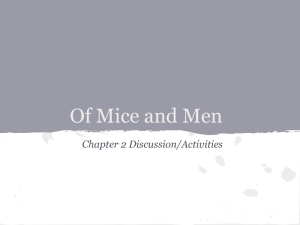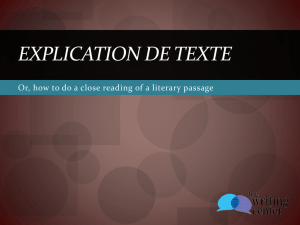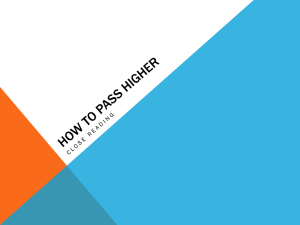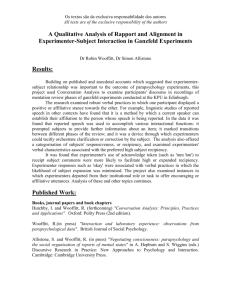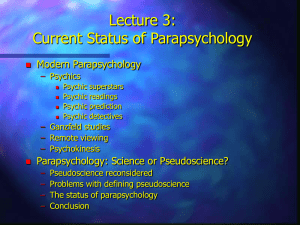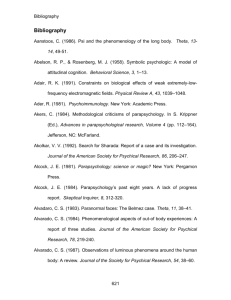Passage 1 - GT Seminar I & II
advertisement
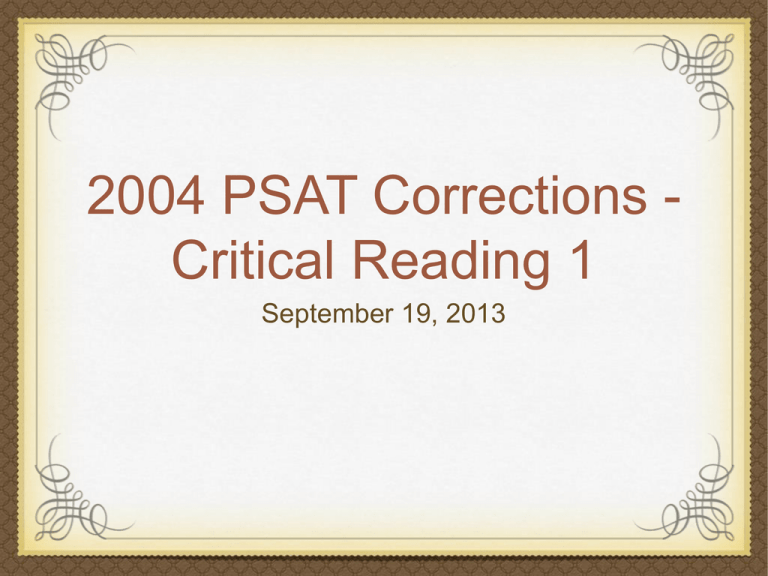
2004 PSAT Corrections Critical Reading 1 September 19, 2013 • Critical Reading (Section 1) • 1. I chose answer A. Excavating, which means to dig up. The correct answer is C. Restoring because the question says it is getting a “facelift,” which is the same thing as “restoring.” • 9. I skipped this one, but the answer is D. “Long sips” indicates he wants to savor the experience like a meal. 24% 6. The dance numbers were of contrasting styles: ___ solos, inviting meditation and instilling tranquility, were intermixed with ensemble performances that were ___ in nature, full ofinvolving wild, excited movements. fast and deep meditation • A. plaintive … languorous energetic in a wild, • B. staccato … boisterous uncontrolled way • C. contemplative … frenetic • D. cacophonous … grandiose • E. brazen … rambunctious 7. The dinner party’s host was truly ___; he impressed his guests with his elegant manners, discriminating taste, and broad education. suave, • A. sardonic courteous, refined in • B. innovative manner • C. diminutive • D. urbane • E. surreal 15% 8. Though friends, Jaelyn and Sean are temperamental opposites: while Jaelyn is outgoing and ___, Sean is usually reserved and ___. friendly, goodnatured, easy to • A. gregarious … ingratiating talk to • B. reclusive … imperious • C. affable … aloof not friendly, cool, distant • D. demure … introverted • E. jovial … congenial 8% 13. According to Koestler’s argument, the 44% advances of modern physics make the claims of parapsychology appear • A. relevant to the experience of everyday life • B. less outlandish than they did originally “Koestler writes… that the unthinkable • C. easier of than before to verify scientifically phenomena ESP (extrasensory perception) appears somewhat less preposterous in the • D. credible to untrained laypersons light of the unthinkable propositions of physics” (18-19) • E. too ordinary to merit much consideration 14. The author of Passage 1 would most likely “For reasons that spiritualists have never been characterize “the great mediums of the 19th27% able to explain, the great mediums of the 19th century” as century could perform their greatest miracles only in darkness” (26-28) • A. possessing no special psychic powers • B. relying on esoteric scientific knowledge “the claims of parapsychology are not backed by • C. believing in the authenticity of their own evidence” (24-25) feats • D. being superior to their present-day counterparts • E. endorsing some contemporary scientific 15. Lines 40-43 contain accusations of • A. arrogance & malice • B. ignorance & incompetence eased; • C. complacency & obtuseness made less • D. secrecy & deception “Their skepticism is not mollified when they the raw data of sensational experiments • find E. bias & elitism sealed off from inspection by outsiders or when failures of replication by unbelievers are blamed on unconscious negative vibes.” 30% 31% 16. The word “curious” in line 50 conveys a sense of “Psi forces have a • A. mild disappointmentcurious habit of fading away when controls are • B. sarcastic disbelief tightened or when the experimenter is a • C. slight impatience skeptic--sometimes even when a skeptic is • D. interest just there to observe.” • E. bafflement 17. In line 66, “patent” most nearly means • A. spreading • • • • 64% “Occasionally you will hear some scientific pundit proclaim B. proprietary there is no evidence for parapsychological C. unobstructedphenomena… That is patent nonsense. For over 2,000 years D. privileged people have been reporting [psychic experiences]…” E. obvious “Two millennia of human experience is a subject matter.”55% 18. The use of italics in(71) lines 71 and 77 of Passage 2 adds emphasis to the author’s “Parapsychology does have something to study.” (77) • A. belief that 2,000 years represents a “Occasionally you will hear some scientific pundit comparatively short span of human history proclaim there is no evidence for parapsychological • B. claim that all people possess at least phenomena… For over 2,000 years people have some psychic potential been reporting [psychic experiences]…” • C. conviction that surveys about psychic experiences cannot all be accurate • D. response to the criticism that parapsychology has insufficient data • E. rebuttal of the notion that parapsychologists rely too much on surveys “Obviously, the very first step in dealing with experiences 19. The author of Passage 2 suggests that the of this kind is to examine how far [we] can go in explaining “factors” (line 83)must areconsider ones that would them. Investigators such factors as malobservation, faulty memory, and deceit.” (80-84) • A. be pervasive in all excellent scientific • • • • 37% research B. characterize the research done by parapsychologists C. indicate the presence of a scientific anomaly D. expose investigators to legal complication E. render reports of psychic experiences invalid 23% “Meteors--stones falling from the sky--were long 20. The references to “Meteors” and (X dismissed as the ravings of lunatics. (line X rays91) were thought many scientists to be to a hoax.” rays” (lineby92) primarily serve suggest that • A. scientific progress is sometimes the result • • • • of accidents B. psychic phenomena may someday come to have a generally accepted explanation C. allegations of deception are often made by those who most fear the truth D. unexplained phenomena are feared by the general public E. scientific irregularities defy explanation 23% 21. The author of Passage 2 would most likely react to Arthur Koestler’s assessment of the status of parapsychology in Passage 1 with Passage 2 • A. mild amusement Yes, it does! Passage 1 • B. scientific detachment Nope. Doesn’t • C. cool indifference exist. • D. muted outrage • E. general agreement Psychic stuff Koestler (quoted in Passage 1): It totally exists! “Surveys have repeatedly shown that anywhere from ½22. to ¾ of the population have had experiences they How might the author of Passage 1 respond believe were psychic.” 46% to the reference to the “Surveys” (line 71) in Passage 2? Passage 1: “the claims of parapsychology are not • A. Surveys areby not considered reliable backed evidence” (24-25) • • • • because they are a relatively new development. B. Surveys are not as useful as reports made immediately after an event. C. Subjective reports of psychic experiences do not constitute proper evidence. D. Appropriately used statistics can bolster the credibility of parapsychology. E. If the reported percentages are true, “For reasons that spiritualists have never been able 21% 23. The author of Passage 2 would most likely to explain, the great mediums of the 19th century could perform their greatest miracles only in respond to the statement in Passage 1 about darkness.” (26-28) “the great mediums” (line 27) by arguing that Passage 2: “Investigators must consider...deceit. • IfA.it the popularity of certain performers proves that all normal explanations fail to reflects culture that fosters them explain thethe experience adequately, then … we have an anomaly.” • B. the standards of 19th century science seem primitive to the modern perspective • C. clairvoyance cannot be proved or disproved because it is a matter of faith • D. mediums require darkness just as scientists need equipment • E. deceit cannot fully account for all reports of psychic events 27% “Occasionally, you will hear some 24. The author of Passage 2 would probably scientific pundit proclaim there is no evidence for parapsychological characterize the author of Passage 1 as most phenomena.” (line 63) like which of the following? Passage 2 Passage 1 • A. The “reporter” (line 54) Yes, it does! Nope. Doesn’t • B. A “theologian” (line 59) exist. • C. A “pundit” (line 63) • D. One of the “people” (line 75) • E. An “anomaly” (line 87) Psychic stuff An expert in a field or subject




